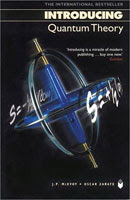
Never let it be said that I’m only a fiction-reader…
I’ve been fascinated with the concepts (and the idea) of quantum theory since I was but a boy in high school. There were several problems, however, that stood in my way:
1) I sucked in both math, physics, and chemistry (though I attained a rather impressive “B” in biology).
2) Quantum theory is notoriously difficult to visualize, and if you’re an artsy-type person who sucks in mathematics, it will perennially seem somehow “just around the corner” from one’s understanding.
However, as Bukowski said, “perseverance is greater than strength”. I’ve never given up my interest in quantum theory, even though I long ago realized that I would probably never truly understand it within the language it was conceived (ie. math). For a writer, not being able to visualize with language is a form of impotence.
One day, during a “second wind” of faith – that I could find a book which could magically explain quantum theory comprehensively – I posted my question to a message board. It would be a year later before someone responded. After adjudicating my level of “maths”, a kind person suggested Introducing Quantum Theory by J.P. McEvoy.
Having previously read (surprise, surprise) Introducing Wittgenstein, I was familiar with the format of the Introducing series; essentially, they are well-written and concisely distilled comic books. I know of no better way to describe them and I can think of no better series of books that manage to grapple subjects as diverse as Keynesian Economics and Kafka for the curious mind. They also make great streetcar reads.
It took some hunting – let’s face it, this isn’t exactly a top-seller – but eventually I found a copy (with thanks to Toronto’s World’s Biggest Bookstore).
And now that you’ve read my heart-warming prelude, the review…
The most important paragraph in this book, as I discovered about a quarter of the way through, is on the second last page, in the Further Reading section:
Quantum theory cannot be explained. Physicists and mathematicians from Niels Bohr to Roger Penrose have admitted that it doesn’t make sense. What one can do is discover how the ideas developed and how the theory is applied. Our book has concentrated on the former.
I wish I’d known this when I was a kid.
That said, Introducing Quantum Theory is an excellent primer. It focuses on the historical impetus which led to the stumbling-upon of the theories which now formulate our current (if not fixed) understanding of quantum phenomena. It starts with establishing the era of Classical (Newtonian) Physics – so assured were scientists of the day with the prevailing theories that it was referred to as the Age of Certainty…and, rather deliciously, it began to unravel via the route science often is forged: experimentation. Thanks, primarily, to Max Planck, Albert Einstein, and Niels Bohr, foundational rules of Classical Physics were brought into question and a new, quantum, world was revealed.
The book is full of formulae – it has to be – however, it’s not necessary for the casual reader to use the formulae or to necessarily understand what any given formula does (although the latter would be nice). The concepts are outlined well by J.P. McEvoy – the conflicts, the dead-ends, and the frustrations of the worlds greatest minds as each took turns refining the prevailing speculation. He has done a great job outlining, linearly and non-linearly, the essential questions: how did this happen, when did this happen, who was involved, and – most importantly – why we should care.
It is a book that deserves (requires, perhaps) that the reader approach it from the beginning straight to the end, on several occasions in order to fully grasp the evolution of quantum theory. I fear that, in one read, it may all be too much for most – personally, I look forward to approaching this book again, as I feel it of great value which, over the course of several reads, will keep inspiring me in different ways. It’s important to realize that this isn’t necessarily about science, but about the refinement of how mankind perceives the world around us.
Introducing Quantum Theory, by J.P. McEvoy (ISBN: 1-84046-577-8) is available at an independently owned bookstore near you, or available at various online vendors. I should add, since this book incorporates original illustrations on every page, the graphic artist: Oscar Zarate.


